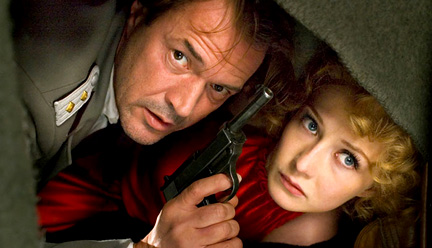

Black Book is the story of Rachel Stein (Carice van Houten), a Dutch Jew who is trying to survive the war in September 1944. Separated from her family, who are also in hiding, Rachel is being hidden by a Christian family. When their home is destroyed by allied bombers, she has nowhere to go. Unexpectedly, a dutch resistance man offers to help her escape to liberated Europe. Going to her family friend and lawyer, she gets money and diamonds for survival. When he gives the money to her and she doesn't count it, he tells her she must trust no one. And trust/betrayal is a key theme developed by director Paul Verhoeven in this English-subtitled Dutch movie.
When Rachel shows up at the rendezvous, she is surprised to see her parents and brother, along with a number of other Jews seeking escape. Boarded onto a barge, they sail under cover of darkness. To their horror, not long after departure a nazi boat appears and guns them all down. Only Rachel survives. With the help of Gerben Kuipers, a key figure in the Dutch resistance, Rachel becomes Ellis de Vries, a worker in the underground movement, seeking vengeance for her family's murder. On a mission, she meets SS officer Ludwig Muntze (Sebastian Koch, from The Lives of Others), who is obviously attracted to her. When Kuipers son is arrested by the SS, this attraction proves to be opportunistic. What will Ellis do for the resistance effort? Will she seduce an enemy? Will she become one of them to fight against them.
With the help of Gerben Kuipers, a key figure in the Dutch resistance, Rachel becomes Ellis de Vries, a worker in the underground movement, seeking vengeance for her family's murder. On a mission, she meets SS officer Ludwig Muntze (Sebastian Koch, from The Lives of Others), who is obviously attracted to her. When Kuipers son is arrested by the SS, this attraction proves to be opportunistic. What will Ellis do for the resistance effort? Will she seduce an enemy? Will she become one of them to fight against them. As Black Book develops, not only does Muntze discover her duplicity, but he keeps it secret. Both have lost too much to the war, and as two lost-souls they find their humanity superseding their nationality. Love moves them, even changes them, where vengeance cannot.
As Black Book develops, not only does Muntze discover her duplicity, but he keeps it secret. Both have lost too much to the war, and as two lost-souls they find their humanity superseding their nationality. Love moves them, even changes them, where vengeance cannot.
Yet even in the midst of spying for the underground there are others who are wearing masks of deception. There is a traitor in the resistance movement. Walking a minefield of deception and espionage, Ellis and Muntze play a dangerous game that offers no room for error.
Verhoeven, better known in America for his English action/thriller movies (Basic Instinct, Total Recall, Robocop), creates a film that is not typical Hollywood. Despite some obvious plot contrivances and a little too much sex, Verhoeven explores the complexities of human nature and offers a film that does not paint its picture in terms of black and white. Instead of the stark contrasts of good and evil, the main characters have elements of both. No one is completely good. And van Houten is up to the task of carrying the film on her shoulders, as the main character.
Black Book raises some interesting moral and ethical questions. Can a person of faith be a spy? In this case a Jew, if her religion says it is wrong to lie, should she do this to survive? Is it different in war-time with your country occupied by the enemy? In the Old Testament God said to the Hewbrew nation: "Do not steal. Do not lie. Do not deceive one another." (Lev 19:11). Clearly Rachel was violating the scriptures of her faith. What would we have done? For Christians, the New Testament echoes this prohibition on lying (Col. 3:9). So, how would we respond today in a similar situation?
Space does not permit a complete answer to this complex question, but it seems difficult to reconcile the practice of espionage with the practice of religion or faith. Espionage requires that the self be compartmentalized to avoid slipping up. That seems counter to a true faith, that seeks to be holistic and fully integrated into one's identity.
Beyond this, the film poses the question, who can we trust? Indeed, who is our enemy? As Rachel/Ellis did not know who the traitor was, who she was fighting against, do we know and understand who is against us? It is trite to say that we can trust God (Psa 26:1, Prov 3:5) but it is a truism. And it seems trite, too, to say that our enemy is the devil (1 Pet 5:8), but it, too is true. Our fundamental enemy is Satan, although we also face internal enemies that are of our own making, related to our sinful nature (our "flesh"), such as our addictions and selfish desires. Too often, though, we see evil men as our enemies. They may seek to do us harm, yet Jesus tells us to love our enemies and pray for them (Matt. 5:44). They are, after all, human with the possibility of redemption. As Muntze displayed to Ellis, even a Nazi has a humanity that is capable of being reached and loved. Ultimately, we must trust God, resist the devil, and love humanity, even those who might persecute and oppose us. Easy to say, difficult to do!
Copyright ©2008, Martin Baggs

Excellent insight...I appreciate your thoughts as I have accepted the challenge of working on a piece about the Dutch Resistance. Best of Luck and thanks for sharing.
ReplyDelete